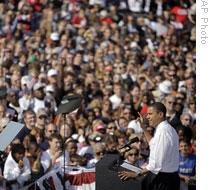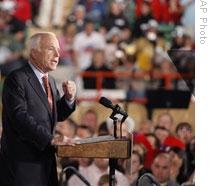VOA慢速英语 2008 1025a
搜索关注在线英语听力室公众号:tingroom,领取免费英语资料大礼包。
(单词翻译)
This is IN THE NEWS in VOA Special English.Americans will elect a new president one week from Tuesday.
As the campaign enters its final week, some are still undecided. Two polls, from the Associated Press and Investor's Business Daily, showed Barack Obama leading by just one point among likely voters. But other opinion polls show him more than ten percentage points ahead of John McCain.
 |
| Barack Obama speaking to a huge crowd in St. Louis, Missouri, last Saturday |
Barack Obama has collected record amounts of donations -- one hundred fifty million dollars last month alone. The latest reports, though, show that fund raising slowed during the first two weeks of October, when he raised thirty-six million dollars.
His campaign is spending heavily on TV and radio advertising1 in states that either candidate could win. These include states like Indiana, Nevada, North Carolina and Virginia that have not chosen a Democrat2 for president in a long time. The Illinois senator has also bought thirty minutes on national networks this Wednesday night.
Barack Obama is the first major-party candidate not to join the public financing system for the general election. John McCain agreed to fund raising limits when he chose to accept public financing.
The Arizona senator is limited to spending eighty-four million dollars in public money during the final two months of the campaign. But the Republican National Committee and other joint3 fund-raising committees have been raising additional support.
 |
| John McCain in Denver, Colorado, Friday |
Senator McCain says his opponent broke a promise to accept public financing. But Senator Obama included conditions that could let him change his mind. And that is what he did in June, after his campaign started raising large amounts.
He told supporters that "the public financing of presidential elections as it exists today is broken." He said "we face opponents who've become masters at gaming this broken system."
Barack Obama has raised more than six hundred million dollars in all. That almost equals the combined total raised by President Bush and John Kerry in the two thousand four election.
John McCain says he worries not just about this election but also the future if candidates no longer stick to public financing. He noted4 on Fox News Sunday that public financing was a result of the Watergate scandal.
That involved illegal activities financed by President Richard Nixon's re-election committee in the early nineteen seventies. Watergate, as well as concerns about the influence of large donations, led to new campaign finance rules.
Public financing of presidential candidates began in nineteen seventy-six, though legislation was first proposed a century ago.
In two thousand two, Congress increased rules for political parties with a campaign reform measure known as the McCain-Feingold Act. John McCain and Democratic Senator Russ Feingold were the main authors.
Jay Dow is a political scientist at the University of Missouri. He says the parties have reacted to those rules by raising more money among smaller donors5. He says small donations now produce most of the money that goes into the political process.
And that's IN THE NEWS in VOA Special English, written by Brianna Blake. I'm Steve Ember.
 收听单词发音
收听单词发音 




